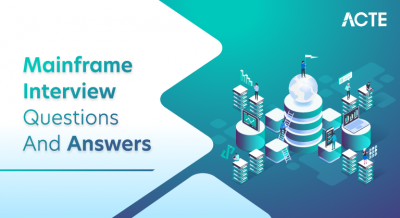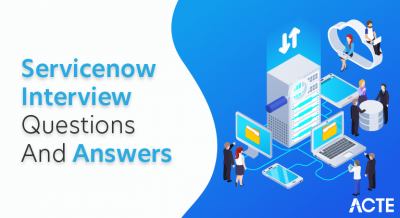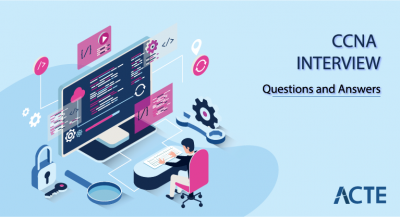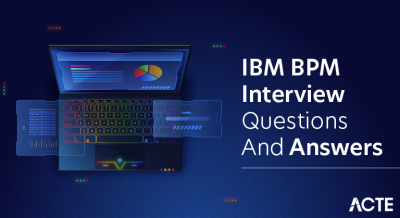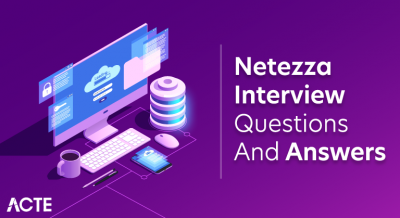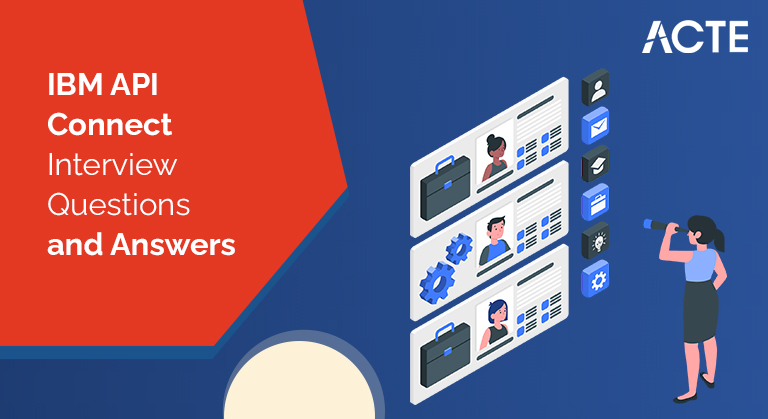
We provide an IBM API Connect Interview Questions guide that offers a comprehensive overview of key API development and management topics using IBM API Connect. Covering a broad spectrum of concepts, the interview questions address fundamental API Connect components, security considerations, and integration strategies. The guide delves into API lifecycle management, policies and security enforcement, data transformation, and API testing. Whether for beginners or experienced professionals, this resource provides valuable insight into the intricacies of IBM API Connect, facilitating effective interview preparation and enhancing the understanding of API-related concepts in the IBM ecosystem.
1. What is IBM API Connect?
Ans:
IBM API Connect is a comprehensive API management solution strategically crafted to address the evolving needs of organizations in the digital era. Functioning as a unified platform, it orchestrates the complete life cycle of APIs, offering a seamless integration of creation, exposure, and management processes.
2. What are the key features of IBM API Connect?
Ans:
The pivotal features of IBM API Connect encompass a diverse spectrum, including an intuitive visual designer that simplifies the API creation process, robust security enforcement mechanisms, advanced testing tools, analytics capabilities for insightful performance monitoring, and a collaborative developer portal. These features provide organizations with a powerful toolkit for efficient API development and management.
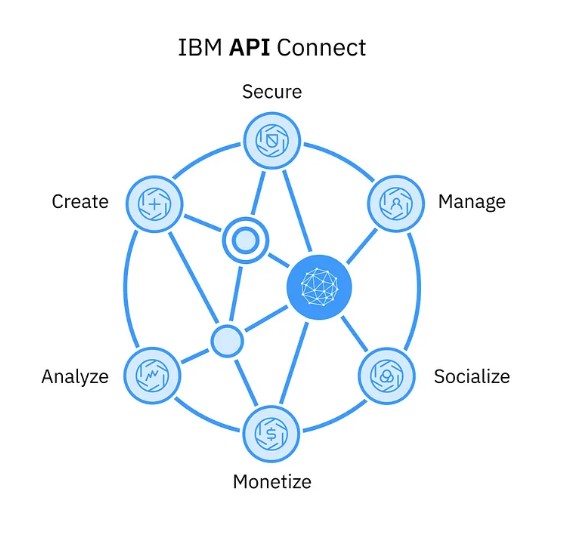
3. How does API Connect facilitate API creation?
Ans:
API Connect revolutionizes API creation through an innovative visual designer. This tool empowers developers by allowing them to design APIs visually, reducing the reliance on extensive coding. The result is an expedited development process, fostering collaboration and accelerating time-to-market for new APIs.
4. What security features does IBM API Connect offer?
Ans:
Security is paramount in API management, and IBM API Connect addresses this with a multifaceted approach. It incorporates OAuth support, robust API key management, and fine-grained role-based access control. Collectively, these features create a fortified environment, safeguarding APIs and sensitive data against unauthorized access and potential threats.
5. How does API Connect handle API testing?
Ans:
API Connect takes a proactive stance on API quality assurance through its embedded testing tools. These tools empower developers to validate and troubleshoot APIs during the development phase rigorously. Organizations can minimize the risk of issues impacting production environments by ensuring the reliability and robustness of APIs before deployment.
6. What role does analytics play in API Connect?
Ans:
Analytics forms a cornerstone of IBM API Connect, providing organizations valuable insights into API usage, performance, and other critical metrics. Through comprehensive analytics capabilities, decision-makers can gain a holistic view of how APIs are utilized, enabling data-driven strategies for optimization, scalability, and performance enhancements.
7. How does API Connect support developer collaboration?
Ans:
Developer collaboration is intrinsic to API Connect’s design, prominently manifested in its developer portal.This dedicated platform is a centralized hub where developers can discover, test, and consume APIs. This collaborative ecosystem fosters knowledge sharing, innovation, and efficient communication among developers, contributing to the overall success of API initiatives.
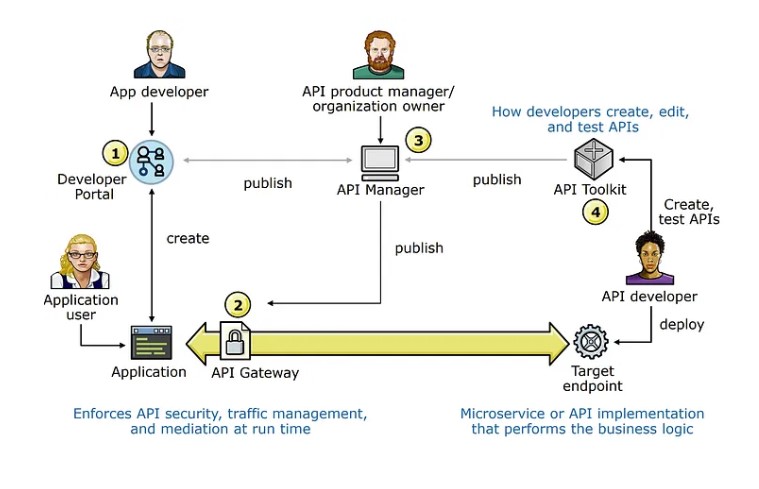
8. Can API Connect integrate with existing systems?
Ans:
Yes, one of the defining strengths of API Connect is its seamless integration capability with a myriad of existing systems and databases. This flexibility allows organizations to leverage infrastructure investments while adopting API Connect for advanced API management functionalities. The result is a harmonious integration of new and existing technologies, optimizing the overall IT landscape.
9. How does API Connect ensure fault tolerance?
Ans:
- Load balancing for traffic distribution
- Automated failover mechanisms
- Redundancy in deployment
- Disaster recovery planning
- Continuous monitoring for quick issue resolution
10. What role does API Connect play in API versioning?
Ans:
API Connect is instrumental in facilitating API versioning, allowing organizations to manage changes and updates to APIs in a controlled manner. This ensures a smooth Transition for existing API consumers, minimizing disruptions while allowing continuous improvement and innovation.
11. How does API Connect handle API lifecycle management?
Ans:
API Connect takes a comprehensive approach to API lifecycle management, covering the entire span from creation and testing to deployment and retirement. This end-to-end lifecycle management ensures governance, control, and optimization at every stage, enhancing the overall efficiency of API initiatives.
12. What security protocols are supported by API Connect?
Ans:
API Connect supports industry-standard security protocols, including OAuth for authentication and authorization, API keys for access control, and SSL/TLS for secure data transmission. This robust security framework ensures the confidentiality and integrity of data exchanged through APIs.
13. Is API Connect compatible with Kubernetes?
Ans:
- Yes, it supports Kubernetes orchestration
- Ensures scalability and containerization
- Simplifies deployment and management
- Seamless integration with containerized environments
- Enables efficient microservices architecture
14. How does API Connect handle rate limiting and throttling?
Ans:
API Connect empowers organizations to implement rate-limiting and throttling policies, controlling the number of requests made to APIs. This capability is crucial for preventing abuse, ensuring fair usage, and maintaining optimal API performance under varying demand levels.
15. What deployment options are available for API Connect?
Ans:
API Connect provides flexibility in deployment options, catering to diverse organizational needs. It supports both on-premises deployment for those with specific infrastructure requirements and cloud-based deployment for those leveraging the advantages of cloud services.
16. How does API Connect address scalability concerns?
Ans:
API Connect is designed to scale horizontally, allowing organizations to handle increased API traffic seamlessly by adding more resources. This scalability ensures that the platform can adapt to evolving demands, supporting the growth of API usage within the organization.
17. What role does API Connect play in API documentation?
Ans:
API Connect automates the generation of comprehensive API documentation. This documentation is crucial for developers, as it provides clear and detailed information about the API, including endpoints, parameters, and usage instructions, fostering ease of integration and collaboration.
18. How does API Connect handle API monetization?
Ans:
API Connect supports API monetization by allowing organizations to define pricing plans, track usage, and generate revenue from their APIs. This monetization capability provides a strategic avenue for organizations to capitalize on the value of their APIs.
19. Can API Connect be integrated with existing CI/CD pipelines?
Ans:
Yes, API Connect can seamlessly integrate into existing Continuous Integration/Continuous Deployment (CI/CD) pipelines. This integration streamlines the development and deployment processes, ensuring that API updates can be efficiently tested, validated, and deployed in a controlled manner.
20. What tools does API Connect provide for monitoring and logging?
Ans:
API Connect offers robust monitoring and logging tools that enable organizations to track API performance, identify issues, and generate insights. These tools contribute to proactive management, allowing organizations to optimize API performance and address potential problems promptly.
21. How does API Connect handle API version control?
Ans:
- Provides automated versioning
- Supports semantic versioning
- Allows rollbacks to previous versions
- Manages version lifecycle
- Simplifies API version maintenance
22. How does API Connect handle security vulnerabilities in APIs?
Ans:
API Connect includes security scanning tools that proactively identify and address potential vulnerabilities in APIs. This proactive approach helps organizations bolster the security posture of their APIs, reducing the risk of exploitation and data breaches.
23. Does API Connect offer API mocking capabilities?
Ans:
- Yes, for efficient testing
- Mock services for API simulations
- Facilitates early development stages
- Validates API behaviour
- Accelerates development cycles
24. What is the role of the API Connect Gateway in the architecture?
Ans:
The API Connect Gateway serves as the runtime component in the architecture, responsible for processing and managing API requests. It acts as a crucial intermediary, enforcing security policies, handling traffic, and ensuring the reliable execution of API operations.
25. Can IBM API Connect enforce API usage policies?
Ans:
Yes, through rate limiting
- Throttling mechanisms
- Security policies
- Custom policies
- OAuth-based access controls
26. How does API Connect support hybrid cloud environments?
Ans:
API Connect is designed to seamlessly operate in hybrid cloud environments, offering organizations the flexibility to leverage both on-premises and cloud infrastructure. This hybrid approach accommodates diverse IT architectures and facilitates a smooth transition to cloud-based solutions.
27. What distinguishes IBM API Connect from other API management solutions?
Ans:
| Aspect | |||
| Architecture | Microservices-based with LoopBack framework integration. | Architecture varies; not all use microservices. | |
| Developer Portal | Comprehensive portal for API documentation and testing. | Features in Developer Portals may differ. | |
| API Versioning | Robust versioning with clear management of API versions. | Versioning approaches may vary. | |
| Integration | Seamless integration with other IBM products and services. | Integration capabilities vary. | |
| Analytics/Monitoring | Advanced tools for API performance monitoring and analytics. | Varies in terms of analytics and monitoring capabilities. |
28. How does API Connect ensure compliance with regulatory requirements?
Ans:
API Connect incorporates features that enable organizations to enforce security and compliance policies, ensuring adherence to regulatory requirements and industry standards. This proactive approach helps organizations maintain regulatory compliance and uphold data integrity.
29. Can API Connect be used for both REST and SOAP APIs?
Ans:
Yes, API Connect is versatile and supports REST (Representational State Transfer) and SOAP (Simple Object Access Protocol) APIs. This versatility allows organizations to manage and expose APIs, regardless of the underlying communication protocol, accommodating diverse integration needs.
30. How does API Connect handle API monetization strategies?
Ans:
- Defines pricing plans
- Tracks API usage for billing
- Supports subscription models
- Generates reports on revenue
- Facilitates business model flexibility
31. How does API Connect handle versioning of API schemas?
Ans:
API Connect provides functionality for versioning API schemas, enabling organizations to manage changes to data structures in a controlled manner. This ensures backward compatibility and allows for a smooth evolution of APIs without disrupting existing integrations.
32. Can API Connect integrate with external identity providers?
Ans:
- Yes, through OAuth support
- Integrates with LDAP and SAML
- Enables single sign-on (SSO)
- Supports external authentication
- Ensures secure user identity management
33. What role does the API Connect Developer Toolkit play?
Ans:
The API Connect Developer Toolkit is pivotal in the API development process. It provides developers with tools to design, test, and document APIs, streamlining the development workflow and enhancing collaboration among development teams.
34. How does API Connect support API analytics for business insights?
Ans:
API Connect offers robust analytics capabilities that provide organizations valuable insights into API usage patterns, performance metrics, and other critical data. These analytics empower business leaders to make informed decisions, optimize API strategies, and align API initiatives with broader business goals.
35. How does API Connect handle documentation for APIs?
Ans:
- Auto-generates comprehensive documentation
- Includes API endpoint details
- Provides sample requests and responses
- Supports Swagger and OpenAPI
- Enhances developer onboarding
36. What role does the API Connect Developer Portal serve?
Ans:
The API Connect Developer Portal is a centralized platform where developers can discover, test, and consume APIs. This portal fosters collaboration by providing a user-friendly interface for developers to explore APIs, access documentation, and engage with the API community.
37. How does API Connect handle API traffic routing based on geolocation?
Ans:
- Supports geolocation-based routing
- Routes requests based on user location
- Enhances content delivery strategies
- Facilitates regionalized API access
- Optimizes performance for global users
38. How does API Connect handle data transformation and mediation?
Ans:
API Connect includes data transformation and mediation features, allowing organizations to ensure compatibility between different data formats and structures. This capability facilitates seamless communication between diverse systems and applications, promoting interoperability.
39. What are some key benefits of implementing IBM API Connect?
Ans:
Implementing IBM API Connect yields a multitude of benefits. These include accelerated API development through visual design tools, enhanced security with robust authentication and encryption mechanisms, improved collaboration among developers via dedicated portals, efficient API lifecycle management, and the potential to generate revenue through strategic API monetization strategies.
40. What authentication mechanisms does API Connect support for backend systems?
Ans:
- Basic authentication
- API key authentication
- Mutual TLS authentication
- OAuth support
- Custom authentication mechanisms
41. What programming languages does IBM API Connect support?
Ans:
- JavaScript
- Node.js
- Java
- Python
- Swift
42. What role does the API Gateway play in API Connect architecture?
Ans:
- Mediates API requests and responses
- Enforces security policies
- Acts as a traffic manager
- Enables protocol transformation
- Centralized point for API interactions
43. What analytics features does API Connect provide?
Ans:
- Detailed API usage analytics
- Performance metrics monitoring
- Error and latency tracking
- Geographic usage insights
- Customizable dashboards and reports
44. Can API Connect enforce content-based routing?
Ans:
- Yes, it supports content-based routing
- Routes based on message content
- Facilitates dynamic routing decisions
- Enhances flexibility in data flow
- Enables efficient message handling
45. How does API Connect handle API request transformation?
Ans:
- Supports request payload transformation
- Enables data format conversions
- Facilitates protocol transformations
- Streamlines data mediation
- Enhances interoperability between systems
46. How does API Connect ensure data privacy in transit?
Ans:
- Implements SSL/TLS encryption
- Supports HTTPS for secure communication
- Ensures data integrity during transmission
- Utilizes industry-standard encryption protocols
- Mitigates risks of data interception
47. Can API Connect integrate with CI/CD tools other than IBM’s?
Ans:
- Yes, it supports various CI/CD tools
- Integrates with Jenkins
- Compatible with GitLab CI
- Works seamlessly with Travis CI
- Ensures flexibility in the development pipeline
48. Does API Connect provide caching mechanisms for improved performance?
Ans:
- Yes, it includes built-in caching
- Enhances API response times
- Reduces server loads
- Supports both in-memory and distributed caching
- Customizable caching policies
49. Does API Connect support the import/export of API definitions?
Ans:
Yes, API Connect facilitates importing and exporting API definitions in standard formats such as Swagger and OpenAPI. This feature streamlines collaboration and integration with other development tools, allowing seamless transitions between different stages of the API lifecycle.
50. How does API Connect handle API traffic security?
Ans:
- Implements Web Application Firewall (WAF)
- Protects against common security threats
- Enforces security policies at the gateway
- Enables DDoS protection
- Enhances overall API security posture
51. Can API Connect generate custom reports for API analytics?
Ans:
- Yes, it offers customizable reporting
- Generates tailored analytics reports
- Supports user-defined metrics
- Facilitates in-depth analysis
- Enhances visibility into specific API performance aspects
52. What is the role of the API Assembly in API Connect?
Ans:
The API Assembly in API Connect allows developers to design and customize the flow of API requests and responses. It provides a visual interface for creating, modifying and enhancing APIs’ behaviour, enabling developers to implement complex logic and transformations.
53. What role does API Connect play in fostering API discoverability?
Ans:
- Provides a centralized API catalog
- Enables tagging and categorization
- Supports keyword-based search
- Enhances API metadata visibility
- Facilitates seamless discovery for developers
54. How does API Connect handle the rollback of API changes?
Ans:
- Supports automated rollback mechanisms
- Allows reverting to previous API versions
- Ensures versioning consistency
- Minimizes impact on existing consumers
- Enhances risk mitigation during updates
55. How does API Connect handle version control for APIs during development?
Ans:
API Connect includes version control features, allowing developers to track changes, collaborate on different versions, and manage the evolution of APIs throughout the development process. This ensures a systematic approach to versioning, making it easier to maintain and update APIs over time.
56. What role does the API Connect Gateway play in API transactions?
Ans:
The API Connect Gateway is responsible for managing and processing API transactions. It acts as a mediator between clients and APIs, handling request routing, security enforcement, and policy application tasks. This ensures that API transactions are secure, controlled, and efficiently processed.
57. What role does the API Connect Dashboard play in API management?
Ans:
- Provides a visual overview of API performance
- Displays key analytics metrics
- Enables real-time monitoring
- Facilitates quick issue identification
- Enhances decision-making through intuitive data visualization.
58. Can API Connect enforce security policies at different levels?
Ans:
Yes, API Connect supports the enforcement of security policies at multiple levels. Organizations can define policies at the API level, operation level, or even specific assembly steps. This granular control allows for fine-tuning security measures based on the unique requirements of each API or operation.
59. How does API Connect handle API traffic throttling?
Ans:
API Connect provides traffic throttling capabilities to control the processing rate of API requests. This helps prevent abuse, ensures fair usage, and maintains optimal performance by regulating the flow of incoming requests based on predefined limits.
60. How does API Connect handle error handling and response customization?
Ans:
API Connect includes robust error handling mechanisms, allowing developers to define how errors are handled and customize error responses. This ensures that consumers receive clear and meaningful error messages, improving the user experience.
61. What does the API Connect Analytics component play in API management?
Ans:
API Connect Analytics provides insights into the usage and performance of APIs. It collects and analyzes data on API transactions, user interactions, and system behaviour, offering valuable metrics and reports that help organizations make data-driven decisions and optimize their APIs.
62. Can API Connect integrate with third-party monitoring tools?
Ans:
Yes, API Connect supports integration with third-party monitoring tools. This allows organizations to leverage their existing monitoring infrastructure and consolidate API monitoring data with other system metrics, providing a unified view for easier management and analysis.
63. Can API Connect be deployed on-premises and in the cloud simultaneously?
Ans:
- Yes, it supports hybrid deployment
- Allows flexibility in infrastructure choices
- Ensures data sovereignty
- Facilitates gradual migration
- Optimizes resource utilization
64. How does API Connect handle API transformation and data mapping?
Ans:
API Connect offers powerful transformation capabilities to modify and map data between different formats and structures. This is crucial for ensuring compatibility between APIs and their consumers, especially when dealing with diverse data sources and systems.
65. How does API Connect facilitate developer collaboration beyond the portal?
Ans:
- Supports API versioning and collaboration
- Provides Git integration for version control
- Allows collaborative API design
- Streamlines team-based API development
- Enhances communication through built-in collaboration features
66. What security measures does API Connect employ for data at rest in storage systems?
Ans:
API Connect employs encryption and access controls to secure data at rest in storage systems. Implementing industry-standard encryption algorithms and access management policies ensures that sensitive data remains confidential and protected from unauthorized access.
67. Can API Connect enforce role-based access controls for APIs?
Ans:
- Yes, supports role-based access controls
- Defines access permissions for users
- Ensures fine-grained authorization
- Facilitates secure API consumption
- Enhances overall API security governance
68. How does API Connect support custom authentication and authorization mechanisms?
Ans:
API Connect allows organizations to implement custom authentication and authorization mechanisms tailored to their specific security requirements. This flexibility ensures that API access can be controlled according to unique business needs and compliance standards.
69. Does API Connect include tools for automated testing of APIs?
Ans:
- Yes, it features automated testing tools
- Supports regression testing
- Enables continuous integration testing
- Validates API changes systematically
- Facilitates early detection of issues
70. Can API Connect generate client SDKs for different programming languages?
Ans:
Yes, API Connect can automatically generate client SDKs (Software Development Kits) for various programming languages. This feature accelerates the development process for consumers, providing them with ready-to-use code snippets and libraries to interact with APIs in their preferred programming language.
71. How does API Connect handle API deprecation gracefully?
Ans:
API Connect provides tools and documentation to handle API deprecation gracefully. Organizations can communicate deprecation notices to consumers, guide them through the migration process, and ensure a smooth transition to newer API versions without causing disruptions.
72. What role does API Connect play in ensuring API scalability?
Ans:
API Connect ensures API scalability by supporting horizontal scaling and load balancing. This allows organizations to handle increasing API requests efficiently, providing users with a reliable and responsive experience.
73. How does API Connect address compliance with data protection regulations?
Ans:
API Connect includes features and tools to help organizations comply with data protection regulations, such as GDPR. This includes consent management, data anonymization, and robust security measures to protect user data and privacy.
74. Can API Connect integrate with backend services that use different protocols?
Ans:
Yes, API Connect is protocol-agnostic and can integrate with backend services using various protocols, including HTTP, HTTPS, WebSockets, and more. This flexibility ensures compatibility with a wide range of backend systems and services.
75. What role does API Connect play in supporting microservices architectures?
Ans:
API Connect is well-suited for microservices architectures, providing the tools to design, manage, and secure APIs in a microservices environment. This includes features like API composition, which allows the creation of APIs that aggregate multiple microservices.
76. What role does API Connect play in regulatory compliance?
Ans:
- Enforces security standards
- Supports GDPR compliance
- Enables audit trails
- Implements data encryption
- Facilitates adherence to industry regulations
77. How does API Connect handle API traffic monitoring?
Ans:
- Real-time traffic monitoring
- Tracks API usage patterns
- Identifies peak usage times
- Monitors response times
- Alerts for unusual activity
78. Does API Connect provide out-of-the-box connectors for standard systems?
Ans:
- Yes, it supports popular integrations
- Includes connectors for databases
- Integrates with CRM systems
- Supports ERP integrations
- Facilitates seamless data exchange
79. How does API Connect handle the caching of API responses?
Ans:
API Connect supports caching mechanisms to improve API performance by storing and reusing frequently requested responses. This reduces the need to process the exact requests repeatedly, leading to faster response times and more efficient use of resources.
80. What is the process for updating API documentation in API Connect?
Ans:
Updating API documentation in API Connect is a straightforward process. As APIs evolve, developers can use the visual tooling interface to make changes to API definitions, and the documentation is automatically updated to reflect these modifications. This ensures that documentation remains accurate and up-to-date throughout the API lifecycle.
81. What is the role of API Gateway policies in IBM API Connect with an example?
Ans:
API Gateway policies in IBM API Connect play a crucial role in shaping the behaviour and security of APIs. These policies include rate limiting, security enforcement, and traffic management. For instance, consider a scenario where an organization wants to apply rate-determining and OAuth security to an API. In this case, the rate-limiting policy ensures a specified number of requests per minute, while the OAuth policy enforces secure access with token validation. Combining these policies enhances the API’s performance and security simultaneously.
82. How does IBM API Connect manage API versioning in a microservices architecture?
Ans:
In a microservices architecture, managing API versioning becomes complex due to the distributed nature of services. IBM API Connect addresses this challenge by offering tools for API versioning and API composition. Developers can create APIs that aggregate multiple microservices, and the platform supports versioning at both the API and microservice levels. This enables seamless integration and version control in a microservices environment, ensuring efficient communication and collaboration between diverse services.
83. How do you handle API lifecycle challenges in fast-paced development?
Ans:
API Connect addresses the challenges of API lifecycle management in dynamic development environments by providing a unified platform with robust version control and continuous integration/deployment (CI/CD) support. Developers can track changes, automate testing, and deploy APIs seamlessly. Additionally, the visual tooling interface aids in rapid development, allowing teams to adapt to changes swiftly without compromising the stability and reliability of the APIs.
84. How does API Connect ensure backward compatibility during updates?
Ans:
- Ensuring backward compatibility during API version updates is critical to prevent disruptions for existing consumers.
- API Connect employs versioning, deprecation notices, and comprehensive documentation.
- Developers can use versioning tools to manage backward compatibility, clearly communicate deprecation timelines, and
- Automatically update documentation to guide consumers through the transition to newer API versions without impacting existing implementations.
85. How does API Connect manage API deployment in a multi-cloud environment?
Ans:
API Connect is designed to seamlessly operate in multi-cloud environments, offering API deployment and management flexibility. It supports deployment across different cloud providers, enabling organizations to leverage diverse cloud infrastructures. This capability ensures that APIs can be deployed where needed, providing resilience, redundancy, and optimal performance across multiple cloud environments.
86. What is API Connect’s role in implementing API monetization strategies?
Ans:
API Connect is pivotal in implementing API monetization strategies by providing API productization and revenue generation features. Organizations can create API products, set pricing models, and manage subscriptions, allowing them to offer APIs as products to external developers or partners. The platform’s monetization capabilities enable organizations to create new revenue streams and foster innovation through external API consumption.
87. How does API Connect support custom authentication and security considerations?
Ans:
API Connect supports the implementation of custom authentication mechanisms to meet specific security requirements. Organizations can integrate custom authentication protocols, but it’s crucial to consider security implications carefully. Security audits. API Connect’s flexible architecture allows organizations to tailor authentication mechanisms while maintaining high security and compliance with industry standards.
88. API Connect’s integration with CI/CD pipelines – process and significance?
Ans:
Integration with CI/CD pipelines is crucial for efficient API development and deployment. API Connect seamlessly integrates with CI/CD pipelines, automating the build, test, and deployment processes. This integration ensures that changes to APIs are rapidly and consistently propagated through the development lifecycle. The significance lies in reducing manual errors, improving collaboration among development teams, and accelerating the API delivery process.
89. How is API Connect’s security governance for industry compliance?
Ans:
API Connect strongly emphasizes security governance to ensure compliance with industry standards and regulatory requirements. It enforces security policies at various levels, including OAuth for authentication and authorization, encryption for data protection, and adherence to security best practices. Additionally, API Connect provides audit logs and monitoring tools to track and analyze security-related events, supporting organizations in meeting compliance obligations and maintaining a secure API environment.
90. Discuss API Connect’s traffic throttling strategy for high demand.
Ans:
- API traffic throttling is critical in high-demand scenarios to prevent abuse and maintain optimal performance.
- API Connect employs dynamic rate-limiting strategies, allowing organizations to set and adjust limits based on real-time traffic conditions.
- These considerations enable API Connect to handle high-demand scenarios effectively without compromising stability or user experience.
91. Explain the concept and role of API composition in API Connect – complex API development.
Ans:
API composition in API Connect refers to creating APIs that aggregate and orchestrate multiple microservices or backend services. This feature supports the development of complex APIs by allowing developers to design interconnected workflows and integrate various services seamlessly. API composition enhances flexibility, enabling organizations to build APIs that meet specific business requirements, and it streamlines the development process by providing a unified interface for managing interconnected services.
92. What are the methods of API Connect’s data privacy and encryption mechanism?
Ans:
API Connect prioritizes data privacy by implementing encryption mechanisms for both data in transit and at rest. In transit, the platform uses secure protocols such as HTTPS to encrypt data exchanged between clients and APIs, ensuring the confidentiality and integrity of information during communication. For data at rest, API Connect employs encryption algorithms to secure data stored in databases or other storage systems.
93. Discuss API Connect’s integration with identity management systems and its advantages.
Ans:
- API Connect integrates with existing identity management systems, providing organizations a centralized and secure authentication mechanism.
- This integration allows organizations to leverage their established identity management infrastructure, ensuring a consistent and secure user authentication experience.
- Advantages include streamlined user onboarding, simplified access management, and adherence to security policies.
- By integrating with identity management systems, API Connect enhances security while reducing the complexity associated with user authentication and authorization.
94. How does API Connect’s logging, auditing, and their role in compliance and troubleshooting?
Ans:
- API Connect includes comprehensive logging and auditing features to track and analyze API usage, errors, and security events.
- These logs play a crucial role in compliance, providing organizations with a detailed record of API transactions for regulatory purposes.
- Logs offer insights into issues such as performance bottlenecks or unexpected behaviour in troubleshooting, facilitating rapid issue resolution.
- By providing detailed and accessible logs, API Connect supports organizations in maintaining compliance, enhancing security, and ensuring the reliability of their APIs.
95. Explain the concept of API orchestration in API Connect and its role in advanced workflows.
Ans:
- API orchestration in API Connect refers to coordinating and sequencing multiple API calls to achieve a specific business process or workflow.
- This feature enables developers to design sophisticated API workflows by defining the order and conditions for executing various API calls.
- API orchestration enhances the flexibility and complexity of API workflows, allowing organizations to create advanced scenarios where multiple APIs work together seamlessly.
- This capability is precious for building comprehensive solutions that integrate and coordinate diverse services and functionalities.


